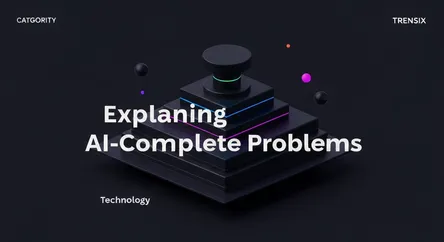Technology
Explaining AI-Complete Problems

Discover AI-Complete problems, the most challenging tasks in AI, considered as difficult as creating true artificial general intelligence (AGI).
What is it?
AI-Complete refers to the most difficult class of problems in artificial intelligence. Informally, these are tasks presumed to be equivalent to solving the central AI problem—creating a machine with human-like general intelligence. To solve an AI-Complete problem, a system would need the full range of human cognitive abilities, including natural language understanding, commonsense reasoning, and complex problem-solving. A classic example is passing the Turing Test, where a machine must be indistinguishable from a human in conversation. Other examples include advanced computer vision and fully autonomous navigation in unpredictable environments.
Why is it trending?
As AI models like large language models (LLMs) become increasingly sophisticated, the line between narrow AI and general intelligence is a major topic of discussion. The concept of AI-Completeness is trending because it provides a framework for understanding the remaining hurdles to achieving Artificial General Intelligence (AGI). While today's AI can perform impressive specific tasks, it struggles with the holistic, commonsense reasoning characteristic of AI-Complete problems. This term is resurfacing in debates about the true capabilities and limitations of current AI technology.
How does it affect people?
The pursuit of solving AI-Complete problems drives fundamental research and innovation across the entire technology landscape. For the public, this means the AI tools we use will become more capable, intuitive, and integrated into our daily lives, from smarter virtual assistants to more reliable autonomous vehicles. Understanding this concept also helps manage expectations. It clarifies that while AI is advancing rapidly, the creation of a truly human-like intelligence is an immense challenge that is not just around the corner, grounding the public discourse in scientific reality.